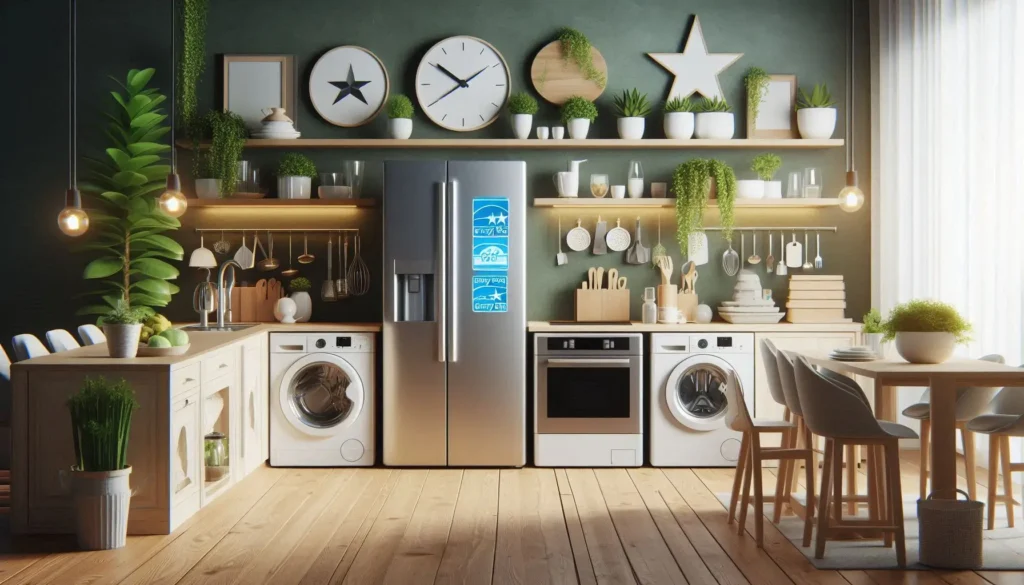In an era of increasing awareness about climate change and environmental sustainability, energy-efficient appliances have emerged as a practical solution for households seeking to reduce their ecological footprint. These appliances not only conserve energy but also lead to significant cost savings on utility bills over time. In this blog post, we will explore the benefits of energy-efficient appliances, how they work, and how to choose the right ones for your home.
Why Choose Energy-Efficient Appliances?
1. Save Money on Utility Bills
One of the most compelling reasons to invest in energy-efficient appliances is the significant potential savings on utility bills. According to the U.S. Department of Energy, energy-efficient appliances use advanced technology to consume less electricity while still delivering optimal performance.
Example Savings:
- Refrigerators: An energy-efficient refrigerator can save you between $200 and $300 over its lifetime compared to a conventional model.
- Washing Machines: Energy-efficient washers can reduce your water consumption by 30% to 50%, translating to lower water bills.
2. Environmental Benefits
Energy-efficient appliances contribute to reduced greenhouse gas emissions by decreasing the overall demand for electricity. When you use less energy, it helps reduce the burning of fossil fuels, which is a major source of carbon emissions.
How it Works:
- Reduced Energy Consumption: By requiring less electricity, energy-efficient appliances alleviate the burden on power plants, thereby cutting pollution.
- Sustainable Resources: Many energy-efficient models are designed to be more sustainable and often use recyclable materials.
3. Improved Home Comfort
Energy-efficient appliances often perform better than their traditional counterparts, leading to increased comfort in your home. This includes better temperature regulation, enhanced air quality, and quieter operation.
Benefits:
- Smart Technology: Many energy-efficient appliances are equipped with smart technology that allows for better monitoring and control, ensuring optimal performance.
- Better Insulation: Appliances like energy-efficient refrigerators are better insulated, maintaining temperature more effectively and minimizing energy loss.
Key Features of Energy-Efficient Appliances
1. Energy Star Certification
One of the most recognized labels for energy efficiency is the Energy Star label, established by the U.S. Environmental Protection Agency (EPA). Appliances that earn this certification meet rigorous energy efficiency guidelines set by the EPA.
Features of Energy Star Products:
- Minimum Energy Requirements: Energy Star products must meet or exceed specific energy performance standards.
- Independent Testing: The efficiency claims of Energy Star products are backed by independent testing and verification.
2. Advanced Technology
Many energy-efficient appliances utilize advanced technology to enhance their performance and reduce energy consumption. For example:
- Inverter Technology: Found in energy-efficient refrigerators and air conditioners, inverter technology helps regulate energy use by adjusting compressor speed based on cooling needs.
- Smart Sensors: Many washing machines use sensors to detect load size and adjust water levels accordingly, preventing unnecessary waste.
3. Improved Insulation
Energy-efficient appliances often feature better insulation, which helps maintain temperature and reduce energy loss. This is particularly important for refrigeration appliances and HVAC systems.
4. Programmable Features
Modern energy-efficient appliances may come with programmable settings, allowing users to set schedules for peak usage times. For instance, running a dishwasher or washing machine during off-peak hours can conserve energy and save on utility bills.
Types of Energy-Efficient Appliances
When it comes to upgrading your home, here are some of the most common types of energy-efficient appliances that can help you save money while being environmentally responsible:
1. Refrigerators
Today’s energy-efficient refrigerators are designed to use efficient cooling technology while maximizing storage space. Look for models with the Energy Star label.
- Features to Consider: Energy-efficient compressors, better insulation, and LED lighting.
2. Washing Machines
Energy-efficient washing machines can significantly reduce both water and energy costs. Front-load washers typically use less water and energy than top-load models.
- Features to Consider: High-efficiency (HE) technology, load sensors, and eco-friendly cycles.
3. Dishwashers
Modern dishwashers consume less water than washing dishes by hand and use smart technology to maximize efficiency. Look for machines that have energy-saving modes.
- Features to Consider: Soil sensors, delayed start options, and energy-efficient drying cycles.
4. HVAC Systems
Heating, ventilation, and air conditioning systems account for a significant portion of energy use in homes. Energy-efficient HVAC systems use advanced technology to maximize comfort while minimizing energy consumption.
- Features to Consider: Programmable thermostats, variable speed motors, and ductless systems.
5. Water Heaters
Energy-efficient water heaters, especially tankless options, can save both water and energy. They heat water only as needed, eliminating the energy loss associated with traditional tank models.
- Features to Consider: Insulation, advanced thermostats, and energy source (electric vs. gas).

Tips for Choosing Energy-Efficient Appliances
1. Do Your Research
Before making a purchase, take the time to research different brands and models. Check energy use estimates provided by the manufacturer and any available ratings or reviews.
2. Look for the Energy Star Label
Always look for the Energy Star label to ensure your appliance meets strict energy performance standards. This is a reliable way to identify energy-efficient options.
3. Compare Operating Costs
While energy-efficient appliances may have a higher upfront cost, consider the long-term savings on utility bills. Some retailers provide calculators to help estimate these costs.
4. Size and Capacity
Choose appliances that match your household needs. For example, a larger washing machine could consume more water than necessary for smaller loads.
5. Check for Rebates
Many utility companies offer rebates or incentives for purchasing energy-efficient appliances. Check with your local utility provider to see what programs are available.
Maintaining Energy-Efficient Appliances
To maximize the lifespan and efficiency of your appliances, regular maintenance is essential:
1. Clean and Inspect Regularly
Regularly clean the filters, coils, and other components to ensure optimal performance. Dust and debris can significantly reduce efficiency.
2. Follow Operating Guidelines
Adhering to the manufacturer’s guidelines for operation and maintenance will not only keep your appliances running efficiently but will also help you get the most out of your investment.
3. Use Energy-Saving Settings
Many modern appliances come with energy-saving modes or settings. Take advantage of these features to maximize energy savings.
Conclusion
Upgrading to energy-efficient appliances is a smart investment for both your wallet and the environment. By selecting appliances designed to minimize energy consumption, you can significantly reduce your utility bills while also contributing to a more sustainable future.
Key Benefits Recap:
- Cost Savings: Reduced utility bills through improved energy efficiency.
- Environmental Impact: Decreased greenhouse gas emissions from lower energy consumption.
- Enhanced Comfort: Better performance and longevity of home appliances.
As you embark on your journey toward a more energy-efficient home, remember to research thoroughly, look for Energy Star certifications, and consider the long-term savings associated with your choices. Make the shift today—it’s a step toward a sustainable lifestyle that benefits both you and the planet!


